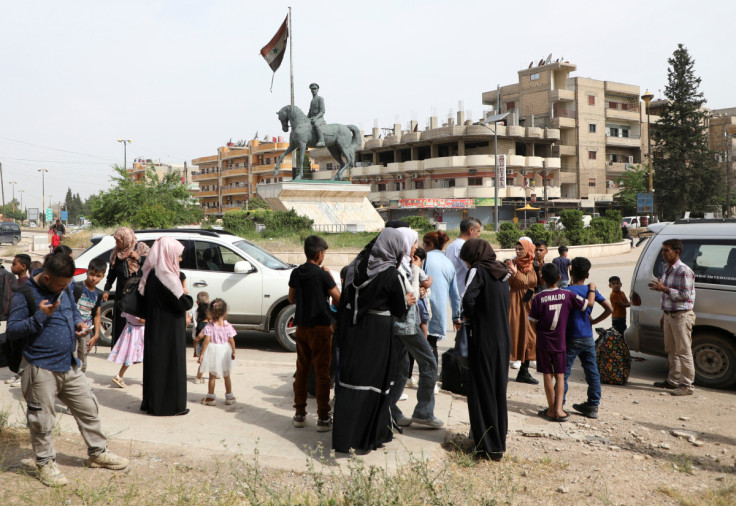Humanitarian efforts must be doubled if refugees are to return to Syria
The Foreign and Commonweath Office call for humanitarian efforts to be doubled, along with the termination of the illicit captagon drug trade, if displaced people are to return to Syria.

On 30 May, the UN Security Council meeting took place to discuss the updated framework for the Security Council resolution, which aims to provide returning refugees with humanitarian aid and support within Syria.
The Syrian Arab Republic crisis remains one of the largest displacement crises in the world. During the 12 years of conflict in Syria, more than half (21 million) of the country's pre-conflict population have been displaced, both internally and in neighbouring countries.
According to the Special Envoy for Syria, the country has seen significant developments throughout the last month. In the latest return intention survey conducted by the United Nations High Commissioner for Refugees (UNHCR), 58 per cent of people said that they hope to return to Syria in the future.
To ensure a safe passage and place of refuge for the refugees who are returning to their homeland, the Foreign and Commonwealth Office in the UK called for humanitarian efforts to be doubled in areas where Syria no longer exports instability to the region.
At the UN Security Council meeting, Ambassador Barbara Woodward stated: "Security Council resolution 2254 provides the framework to deliver sustainable and lasting peace for the people of Syria."
"This includes 15.1 million people in need because of the impact of 12 years of war, including 4.1 million people in North West Syria who faced a crisis on top of a crisis when the devastating earthquake hit in February," Ambassador Barbara Woodward added.
It's been over 3 months since the earthquake rocked Syria and Turkiye, leaving destruction in its wake.
— ICRC (@ICRC) May 29, 2023
Imagine what it did to Syrians. pic.twitter.com/emThcKS9Lf
Within the first six months of 2022, around 38,400 people opted to go back to Syria from neighbouring countries.
President Erdoğan of Turkey recently revealed his plans for one million refugees to return to Syria in 2023.
According to the UNHCR, "there has been an increase of negative rhetoric towards refugees", in the years 2022 and 2023.
The UNHCR also recalled that the negative rhetoric is accompanied by heightened calls for people to return to the Syrian Arab Republic, particularly in Lebanon and Turkey.
As of March 2023, there were around 1.2 million refugees from Syria in Lebanon. Turkey currently hosts around 3.6 million registered Syrian refugees.
The UNHCR also state that, while some people are returning to Syria, "the vulnerabilities of Syrian refugees are likely to worsen in 2023."
Erdogan: We are preparing to return Syrian refugees
— Spriter (@Spriter99880) May 23, 2023
The President of Turkey says that his government is preparing a plan to return Syrian immigrants and refugees to their country, during which one million refugees will be returned to Syria. pic.twitter.com/DFgZcQwqUG
At the UN Security Meeting, Ambassador Barbara Woodward also called for the Security Council resolution to provide the people of Syria with clarity on missing persons.
A study in March 2023 found that more than 13,000 people have been reported missing since the start of the conflict in Syria.
She said: "They deserve answers on the whereabouts of their loved ones who have been detained and or are missing."
Ambassador Barbara Woodward concluded: "This is a core issue that affects all Syrians, on all sides of the conflict. Progress on this issue is essential for rebuilding trust with the Syrian people and putting in place the conditions needed for refugees to choose to go home."
The UNHCR is also continuing to provide significant humanitarian aid for internally displaced people and people returning to Syria.
The UNHCR recalled that: "[The] UNHCR will focus on community mobilisation and building self-reliance, aimed at reducing vulnerabilities and protection risks by providing services through community-based structures and networks."
Over 777,000 people from Syria have been recognised as being in need of resettlement support.
The UNHCR stated that: "Resettlement remains a critical test of responsibility-sharing by the international community."
To protect internally displaced people and the returning Syrian people from the brutality of President Bashar Al-Assad's regime, the Commonwealth Office also noted that the export of the illicit drug captagon must be terminated.
Independent experts estimate the illegal captagon drug trade to be worth up to $57 billion.
Ambassador Woodward declared: "We also need effective action to stem the illegal captagon trade, to demonstrate that regional stability comes above the billion-dollar income the regime currently derives from it."
© Copyright IBTimes 2025. All rights reserved.






















